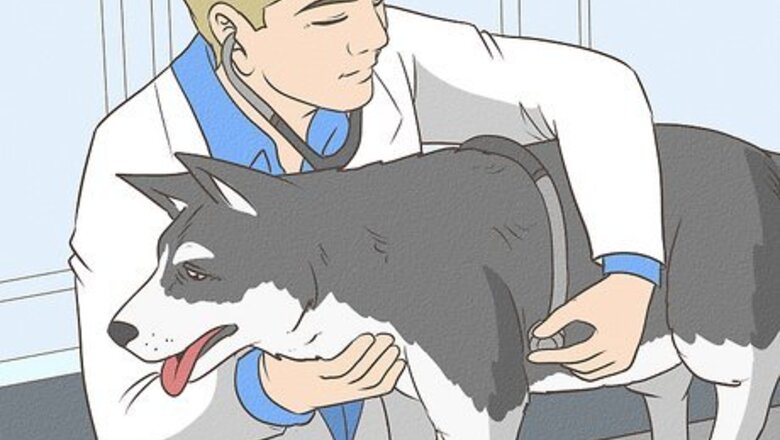
views
Addressing the Root Cause
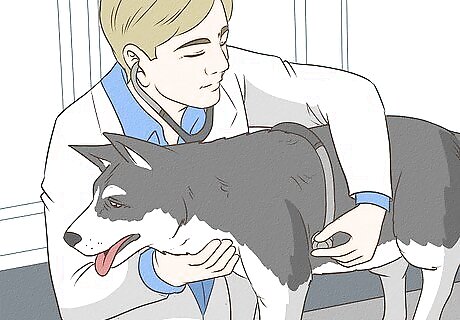
Consult a veterinarian about behavioral changes. If your dog is waking you up more than it used to, a medical problem could be affecting its sleep or stress levels. Visiting a vet is an excellent first step so you can rule out this possibility, or catch problems early. Even if your pet is not sick, a vet can help you pinpoint the cause. Any significant change in behavior or sleep schedule could be a sign of a medical problem. Difficulty eating or eliminating could point to gastric distress that keeps your dog awake. If the dog wakes you up to beg for food in the night, it may be experiencing increased hunger due to diabetes or another metabolic disorder. Unless your dog is sick enough to be throwing up or having diarrhea and needs help getting outside, it should eventually be able to sleep through the night.
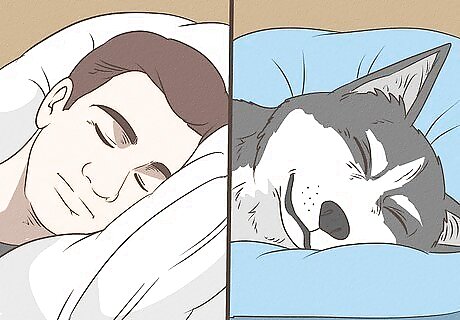
Commit to a good sleep schedule. A regular, predictable sleep pattern makes it easier for your dog to adapt. Do your best to go to sleep at the same time every night, and wake up at the same time every morning. While doggy sleep patterns are different than that of humans – they sleep up to twenty hours a day and sleep for shorter amounts of time – your dog will get used to your sleep schedule over time. Be consistent about not giving your dog attention other than a reprimand if they attempt to wake you before you intended to get up.

Respond to a dog's frequent urination. If your dog wakes you up in the night to go outside, they may have a medical problem such as a urinary tract infection or Cushing's disorder. A vet can diagnose your pet and prescribe medication to treat this problem. If your vet rules these out, your dog may have a weak bladder due to old age. You can make you and your dog more comfortable by providing a pee pad. A dog door is another solution if you have an enclosed yard and are not concerned about dangerous wildlife.
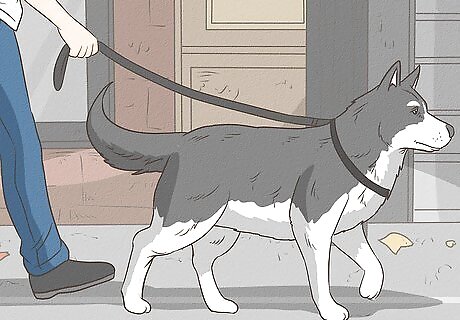
Spend more time exercising your dog. A great way to reduce the likelihood that your dog will wake you up is to tire them out before you go to sleep. You can do this by increasing the amount of time you and your dog exercise together. In the end, a sleeping dog won't be able to wake you up. If you don't have time to exercise your dog during the day, try taking it on a short walk just before you go to bed at night. Allie Bender Allie Bender, Certified Dog Trainer To stop nightly wake-up calls, first ensure your dog gets sufficient daily enrichment through walks, play, training and puzzles. An enriched, tired dog sleeps soundly. Additionally, keep the bedroom dark and quiet for uninterrupted rest. If boredom or anxiety persists, speak to your veterinarian about anti-anxiety medications or calming supplements to promote relaxation.
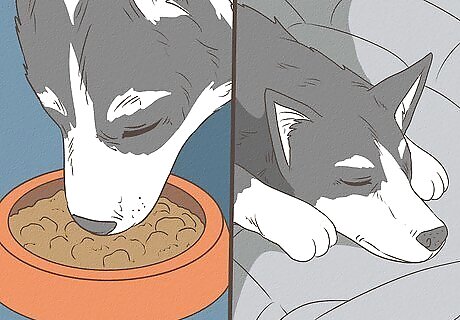
Alter your dog's feeding schedule. You can also decrease the chance of your dog waking you up by changing your dog's food schedule. Ultimately, your dog might be waking you up because they're hungry or are still active because they ate really late. If you think your dog is waking you because they're hungry, push back dinner time an hour or two. This way, your pup's belly will be fuller for a longer time. If you think your dog is waking you because they're hyper from the last meal, move dinner up a little bit. Feeding your dog at 6PM might work more than feeding them at 8PM.
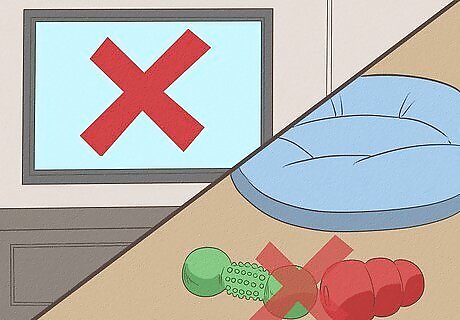
Reduce your dog's stimulation. Another reason your dog might be waking you is because they're still awake, energetic, or are just overstimulated. This can be remedied through a number of ways: Don't play with your dog for a couple of hours before bed. Don't leave toys around your dog's sleeping area. Turn off your TV or any music before bedtime.
Training Your Dog
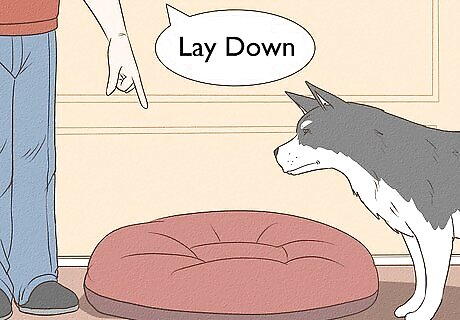
Command your dog to sleep. Sometimes your dog will just wake you up because they’re bored or they want to play. In this case, you should command your dog to lay down and go back to sleep. Use a command like “lay down.” This should get your dog to stop pawing you and licking your face. Say your chosen command in a stern voice. Use the command only once. You may want to point to the ground as you say the command. Training your dog by commands might take several weeks. Don’t lose patience – your dog will eventually learn.
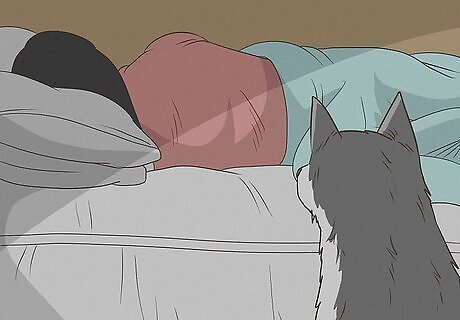
Avoid giving in to your dog. If you reward your dog with attention for waking you up, you will train them to repeat the behavior. Ignore your dog's efforts except for that single "lay down" command — even prolonged scolding can be a "reward." When it is time to get up, spend a little time on your own activities instead of walking directly to the food bowl. Remember, though, your dog might genuinely have to go to the bathroom. Don’t make them suffer because you want another twenty minutes of sleep.

Adjust your schedule for medical conditions. Depending on your dog’s general health, you may have to adjust your lifestyle, habits, and schedule to your dog’s needs. By adjusting to your dog’s needs, you’ll reduce the chance that they’ll wake you up. Consult your vet if your dog's medication or feeding schedule makes it difficult for you to sleep.
Changing Your Dog's Sleep Environment
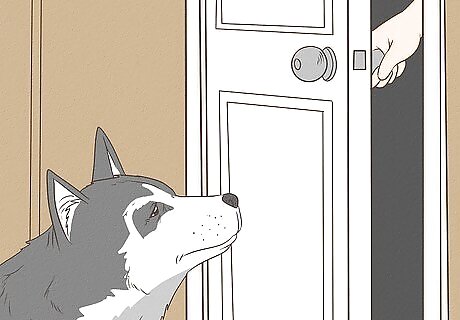
Keep your dog in another room. If you’ve tried everything and your dog still wakes you up, you may consider having your dog sleep in another room. By putting your dog in another room, you’ll make sure that you have restful sleep and your dog is undisturbed during the night. Make sure to provide your dog with a comfortable bed if you put them in another room. Be aware, keeping your dog in another room, especially if they’re already used to sleeping with you, might result in crying, barking, or a dog with hurt feelings.
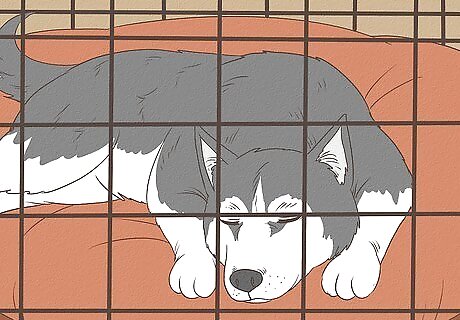
Put your dog in a crate at night. Some dogs may find it hard to sleep without waking up their owner. This is especially true of high energy dogs that are not crated at night. A solution to this is keeping your dog in a crate at night. By putting your dog in a crate, you’ll send your dog the signal that night time is sleep time, and you’ll also remove their ability to run around or disturb your sleep. Housing your dog in a crate at night will prevent them from jumping on you and licking you awake in the morning. Make sure that the crate is big enough for your dog. Dogs 0-15 pounds should have small crates, dogs 16 to 35 pounds should have medium crates, dogs 36 to 65 pounds should have large crates, and dogs over 65 pounds should have extra-large crates.

Let your dog sleep in the same room as you, if they didn't originally. Some dogs may bark to wake you up at night because they’re lonely or want your attention. One way to address this is to have your dog sleep in the same room as you. By moving your dog into the same room as you, you may eliminate the reason why your dog is barking and waking you up. Provide your dog with a crate, bed, or somewhere to sleep in your room. Make sure to set boundaries from the very beginning. This means creating a space and then training your dog to sleep in until you are awake.


















Comments
0 comment